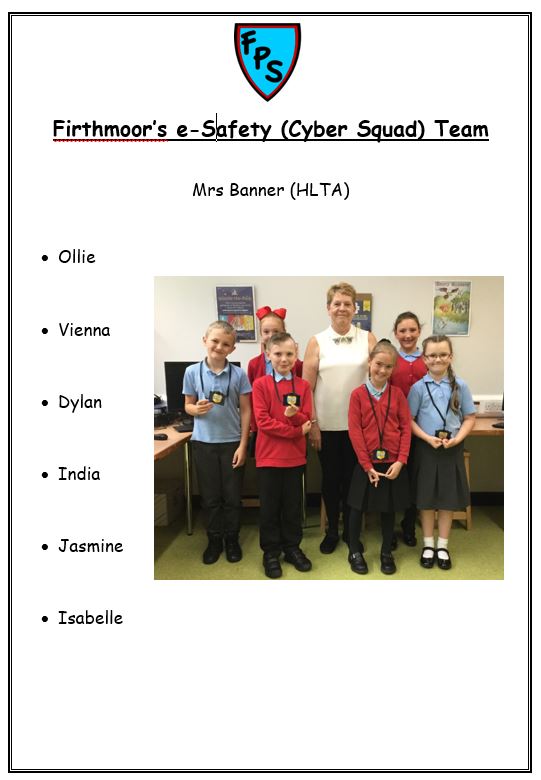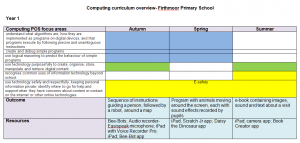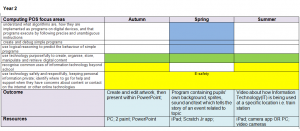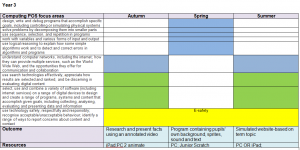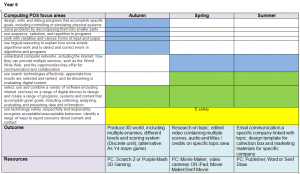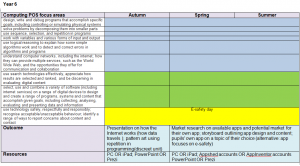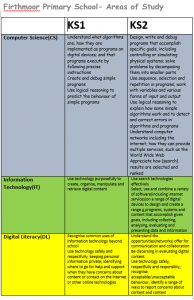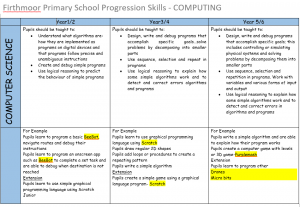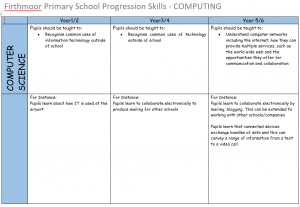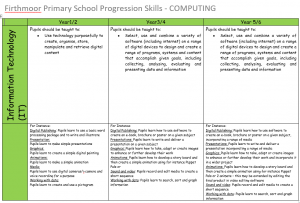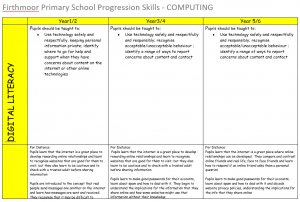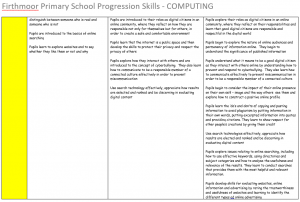Computing and e-Safety
Computing at Firthmoor Primary School
At Firthmoor Primary School we aim to ensure that our children have the necessary computing skills to engage with an increasingly digital world, and to prepare them for future education and work.
Computing lessons focus on developing skills in the three main strands of the National Curriculum framework: Computer Science, Digital Literacy (including e-Safety) and Information Communication Technology.
Termly projects link to and reinforce wider curriculum areas for each year group and allow children to become familiar with a range of computer-based programs, such as Scratch and Purple Mash as well as how to use other technology such as micro:bits and drones.
Children are given the opportunity to produce work in a variety of ways, including designing programs and games and creating presentations, webpages, videos and animations.
We instill in our children the importance of using technology safely and responsibly at all times and e-Safety is therefore taught not only in Computing lessons, but promoted in other curriculum areas and at assemblies and events such as Safer Internet Day. Selected children are also involved in a Cybersquad which promotes e-Safety by peer teaching throughout school.
Years 1 to 6 Computing Curriculum Overviews
New technologies have become an integral part of the lives of children and young people both within and outside of school. Using the Internet is now an everyday occurrence for most children and adults and is seen as an essential resource to support teaching and learning. Unfortunately, the increased use of technology at school and home also exposes children to a number of risks and dangers.
In school, we discuss internet safety as part of our curriculum which includes internet safety weeks, discussions with pupils’ about how to keep themselves safe and the dangers they may face when using various devices including, PCs, mobile phones, tablets and games consoles. The internet access within school is designed expressly for pupil use and includes Lightspeed filtering to ensure access is appropriate to the age of the pupils. Pupils are taught what internet use is acceptable and given clear objectives for its use.
eSafety involves the whole school community, including pupils, staff, governors and parents, to create and maintain a safe online and computing environment for our school by making the best use of technology, information, training and policies.
e-Safety Assembly
Mrs Stannard and The Cyber Squad held a KS2 assembly where she discussed e-Safety with the children. Mrs Stannard highlighted awareness that although the Internet is an incredible tool, it must be used safely and correctly at all times. Pupils also learned more about the ‘SMART’ rules
- SAFE: keeping personal information safe;
- MEETING: not to meet up with someone you meet online;
- ACCEPTING: to think before accepting something from someone online;
- RELIABLE: that not everyone you meet online may be trustworthy;
- TELL: tell a parent, teacher or trusted adult if something upsets you online.
Mrs Stannard concluded the assembly with some real-life scenarios for the children to discuss and by reminding KS2 that they should ask for help and advice if they are ever unsure about something online.
SAFER INTERNET DAY – TUESDAY 11th FEBRUARY 2020
E-Safety Tips for Parents Leaflet
Safety Guides for Parents – National Online Safety
ROBLOX WARNING

There are an increasing number of warnings of misuse in the popular app Roblox.
A number of other schools have posted warnings on their social media and some news outlets have also published articles.
As always it is important to have open and honest discussions with your child on their internet use and make sure privacy and restrictions are set up.
You can read more about it here.
Here are some simple rules for keeping safe online:
Zip it– keep your personal information private and think about what you say and do online
Block it– block people who send you nasty messages and don’t open unknown links and attachments
Flag it– flag up with someone you trust if anything upsets you or if someone asks to meet you offline
The following links can help keep children safe online.
https://www.net-aware.org.uk/ – up to date information on popular apps and games that children and young people are using.
http://www.childnet.com/resources – information and advice on Internet safety.
https://www.internetmatters.org/advice/- excellent site that covers all aspects of internet safety and takes you through setting up parental controls on all gadgets in an easy to follow step by step guide.
https://www.saferinternet.org.uk/advice-centre/parents-and-carers -information and advice on Internet safety.
https://www.familylives.org.uk/ – I like this site offers very useful tips and advice not only on internet safety but a wide range of topics such as bullying and it’s really useful for families.
https://www.everybodyplays.co.uk/ – very good video gaming review site with parent guides on the latest games.
AND ALSO THE FOLLOWING;
It is a company limited by guarantee in England and Wales (Registered no:08027879)
Registered address: Ingleby Moor Crescent, Darlington, County Durham DL1 4RW


